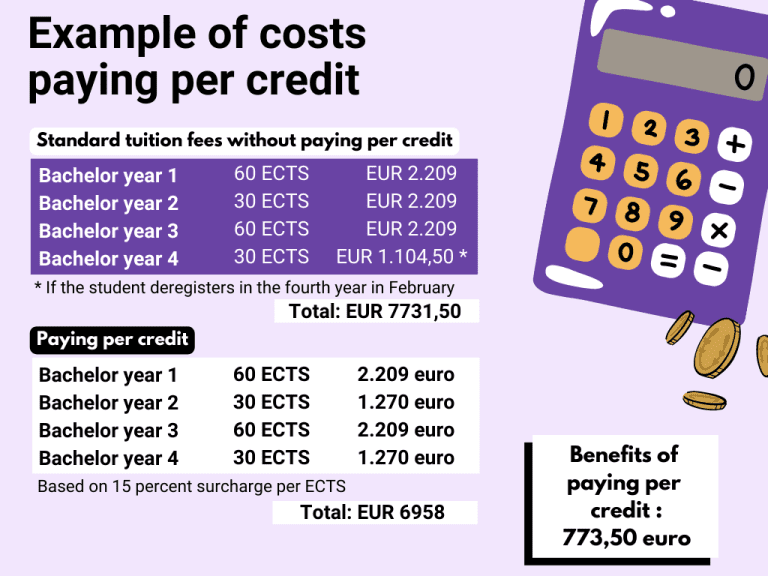Paying by credits instead of annual tuition fees? ‘Flexible studying’ still seems very far away. Nevertheless, Oras wants to know what TU Delft students think of the idea.
(Photo: Justyna Botor)
Setting your own pace of study and paying for each credit. Various universities of applied sciences and universities have experimented with so-called paying per credit (flexstuderen in Dutch) as part of a pilot since 2017. The idea is that students do not pay standard tuition fees anymore, but pay only for the subjects which they have registered for. This could be a solution for groups of people like top athletes, carers, and students with a functional impairment who may not always be able to study full time.

During the flexible studying trial, students paid a 15 percent surcharge per credit. (Illustration: Marjolein van der Veldt)
Pilot
Three universities (Utrecht, Tilburg and the University of Amsterdam) and two universities of applied sciences (Windesheim and Utrecht) are part of the pilot. Because of time pressure, TU Delft did not join the pilot (in Dutch), but Vice Rector Magnificus Rob Mudde did recognise its potential at the time.
After a trial period of six years, the House of Representatives is in any case positive. In June 2022, the Minister even sent a letter to the House proposing to allow paying per credit for specific groups of students (including top athletes, carers and students with a functional impairment) in 2023-2024 and to include it in law.
However, the ruling currently seems a long way off. The VVD considers the target group too small and wants to first assess the need among ‘regular’ bachelor and master students. SP and GroenLinks have their doubts about implementing the system widely. They are worried that the cohesion in degree programmes will be lost if all students would mix up subjects and credits, and they first want to get an idea about the consequences for students and staff.
“These assessments mean that anchoring the proposal in law is no longer tenable in the next academic year,” says Student Council member Maarten De Jong. On behalf of Oras on the Council, he will look into what TU Delft students think about paying per credit. “The Intercity Student Consultation (ISO) has informed us that the Ministry first wants an integrated vision on ‘flexible studying’ before it is adopted across the country.”
Questionnaire
So for now, paying per credit is on hold. “A disappointment,” says De Jong. As he believes that flexible studying would benefit a lot of students, Oras is adopting several initiatives to try to get the subject back on the agenda. One of these is looking at the potential of flexible studying at TU Delft. “Now is the time to show the Executive Board what the needs are and what TU Delft students think about flexible studying.”
- What do you think of flexible studying? Click here to fill in the Paying per credit. Would you get it? questionnaire.
According to De Jong there are plenty of advantages. “The evaluation (in Dutch) of the pilot shows that flexible studying reduces the dropout rate and leads to better course results. Students pay per credit and decide themselves what subjects they take. This makes education more accessible as there is more space for self-development.”
However, there are also disadvantages. It seems that paying per credit makes students less involved in the institution and degree programme, and leads to more work for the student and financial administration. “But,” says De Jong, “It does not lead to more tasks for teachers and academic counsellors. The evaluation shows that what may seem like more work is actually mostly providing the support that students needed anyway and would have had.”
The future
TU Delft believes that studying full time should remain the norm. Should a change in the law make it an option, the Executive Board will consider top athletes, carers, students with a functional impairment, and students who serve on a board for a year as the target group. “It is a huge step in the right direction. It would be good if carers no longer have to worry about financing their studies. Or if board members no longer have to pay the full amount if they work full time for TU Delft students.”
That said, he would still like to see paying per credit being an option for all students. “But this would need a total change in the education system, from student grants to scheduling, and we are nowhere near this. The more students that fill in our questionnaire the better we will know what TU Delft students need. Should flexible studying eventually be turned into law, we would want our vision and any regulations to meet the needs of TU Delft students as much as they can.”
- What do you think of flexible studying? Click here to fill in the Paying per credit. Would you get it? questionnaire.
- The questionnaire is an initiative of Julie Tazelaar (Board Member of Oras) and Student Council member Maarten de Jong.
Do you have a question or comment about this article?
m.vanderveldt@tudelft.nl


Comments are closed.